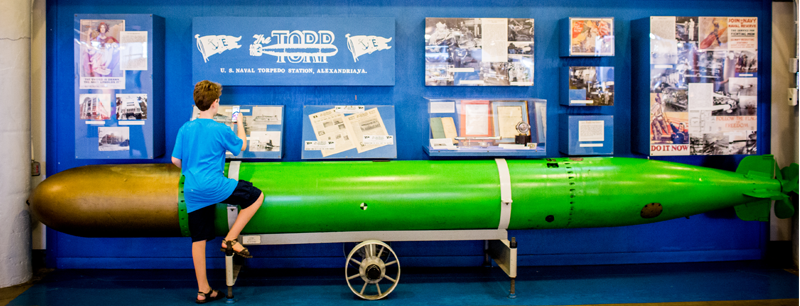US NAVAL TORPEDO STATION IN ALEXANDRIA. ASSOCIATED PRESS PHOTO
The Torpedo Factory in Alexandria is a visual arts center located in an old Department of Defense munitions facility. The U.S. Naval Torpedo Station was built during World War I on old lumber dock known as "The Strand". It wasn't actually completed until after the war ended (as coincidence would have it, the doors opened just one day after the Armistice). During World War II the Torpedo Station scaled up its staff and production capacity to feed FDR's "arsenal of democracy." 5,000 employees worked around the clock in shifts building warheads, propellers, engines and other torpedo necessaries.
A TORPEDO IN THE ART CENTER. TORPEDOFACTORY.ORG PHOTO
The station's main weapon system was the Mark-14, a submarine launched anti-ship torpedo. Unfortunately the Mark-14 was a dud, and repeated and well documented failures produced what the press dubbed a "Great Torpedo Scandal." There were issues with the weapon's magnetic influence exploder that caused a high number of the torpedoes to pass under their targets without detonating.
According to Theodore Roscoe's history of WWII submarine warfare, "the only reliable feature of the torpedo was its unreliability."
It took two years, but the Navy's Bureau of Ordinance eventually did work out the problems, and by the 1943 the torpedoes were greatly improved.
1945 was the high water mark for Alexandria's Torpedo Station. After the end of World War II the Navy handed the munitions factory over to the Smithsonian Institution, who used it for storage. TorpedoFactory.org writes that "Congressional documents, valuable dinosaur bones, art objects from the Smithsonian and German war films and records were stored in sealed vaults."
In 1970 the City of Alexandria purchased the Torpedo Factory and converted it into the arts center we have today.
Related: Washington During World War II


